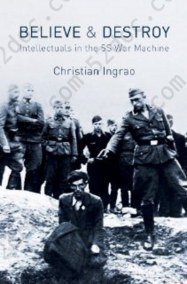注重体验与质量的电子书资源下载网站
分类于: 设计 编程语言
简介

Believe and Destroy: Intellectuals in the SS War Machine 豆 0.0分
资源最后更新于 2020-08-20 14:04:13
作者:Christian Ingrao
出版社:polity
出版日期:2018-01
ISBN:9780745660271
文件格式: pdf
简介· · · · · ·
There were eighty of them. They were young, clever and cultivated; they were barely in their thirties when Adolf Hitler came to power. Their university studies in law, economics, linguistics, philosophy and history marked them out for brilliant careers. They chose to join the repressive bodies of the Third Reich, especially the Security Service (SD) and the Nazi Party’s elite p...
目录
Foreword
Acknowledgments
Glossary
PART ONE: The young men of Germany
Chapter 1 A ‘world of enemies’ (I)
The outbreak of war
The silence of the Akademiker
The ‘time of troubles’: an experience of war?
Chapter 2 Constructing networks
Places to study
Places of association
Networks of solidarity
Chapter 3 Activist intellectuals
The construction of academic knowledge
Knowledge and activism (1919-1933)
‘Combative science’ and SS intellectuals in the Third Reich
The shadow of the Great War
PART TWO: Joining the Nazis: a commitment
Chapter 4 Being a Nazi
The foundations of the doctrine
The origins of Nazi fervour: planning a sociobiological
re-establishment
The appropriation of a system of beliefs
Chapter 5 Entering the SD
Whether to enter the Party or not?
Towards the SD: Nazi careers
Recruitment: a social mechanism of enlistenment
Chapter 6 From struggle to control
From the ‘Security Department of the SS’ (SD) to
the ‘Reich Security Main Office’ (RSHA)
A ‘world of enemies’ (II)
Control
PART THREE : Nazism and violence: the culmination 1939-1945
Chapter 7 Thinking the east, between utopia and anxiety
The curse of Germanic isolation
The Nazi project for a sociobiological re-establishment
Redevelop and settle: forms of Nazi fervour
Chapter 8 Arguing for war: Nazi rhetoric
From the reparative war to the ‘Great Racial War’
From the discourse of security to the discourse of genocide
Expressing violence: defensive rhetorics, utopian rhetorics
Chapter 9 Violence in action
The experience of violence
Demonstrative violence, violence of eradication
A transgressive violence
Violence as rite of initiation
Chapter 10 SS intellectuals confronting defeat
Defeat rendered unreal
Finis Germaniae. The return of the old anxiety
The denouement
Chapter 11 SS intellectuals on trial
Strategies of negation
Strategies of evasion
Strategies of justification: the Ohlendorf case
Conclusion: Memory of war, activism and genocide
Notes
Sources and bibliography
A piece of research and its context
A specific conceptual framework
List of archival collections consulted
Printed sources
Bibliography
Acknowledgments
Glossary
PART ONE: The young men of Germany
Chapter 1 A ‘world of enemies’ (I)
The outbreak of war
The silence of the Akademiker
The ‘time of troubles’: an experience of war?
Chapter 2 Constructing networks
Places to study
Places of association
Networks of solidarity
Chapter 3 Activist intellectuals
The construction of academic knowledge
Knowledge and activism (1919-1933)
‘Combative science’ and SS intellectuals in the Third Reich
The shadow of the Great War
PART TWO: Joining the Nazis: a commitment
Chapter 4 Being a Nazi
The foundations of the doctrine
The origins of Nazi fervour: planning a sociobiological
re-establishment
The appropriation of a system of beliefs
Chapter 5 Entering the SD
Whether to enter the Party or not?
Towards the SD: Nazi careers
Recruitment: a social mechanism of enlistenment
Chapter 6 From struggle to control
From the ‘Security Department of the SS’ (SD) to
the ‘Reich Security Main Office’ (RSHA)
A ‘world of enemies’ (II)
Control
PART THREE : Nazism and violence: the culmination 1939-1945
Chapter 7 Thinking the east, between utopia and anxiety
The curse of Germanic isolation
The Nazi project for a sociobiological re-establishment
Redevelop and settle: forms of Nazi fervour
Chapter 8 Arguing for war: Nazi rhetoric
From the reparative war to the ‘Great Racial War’
From the discourse of security to the discourse of genocide
Expressing violence: defensive rhetorics, utopian rhetorics
Chapter 9 Violence in action
The experience of violence
Demonstrative violence, violence of eradication
A transgressive violence
Violence as rite of initiation
Chapter 10 SS intellectuals confronting defeat
Defeat rendered unreal
Finis Germaniae. The return of the old anxiety
The denouement
Chapter 11 SS intellectuals on trial
Strategies of negation
Strategies of evasion
Strategies of justification: the Ohlendorf case
Conclusion: Memory of war, activism and genocide
Notes
Sources and bibliography
A piece of research and its context
A specific conceptual framework
List of archival collections consulted
Printed sources
Bibliography








